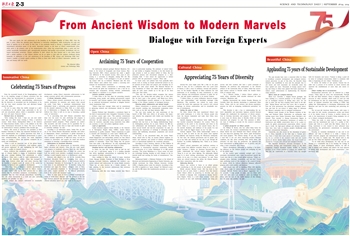
Seventy-five years might seem like a blip on the great wheel of time, but for a civilization with over 5,000 years of history, it tells a story of resilience, renewal and perseverance. As the People's Republic of China celebrates the 75th anniversary of its founding, its deep commitment to unity, peace, harmony and development continues to guide the nation, and add modern aspirations to its ancient wisdom.
"I believe China, as a great civilization, deserves recognition and understanding," said Australian sinologist Colin Mackerras. This sentiment was echoed by many voices around the world who appreciate the country's rich cultural heritage, its diverse communities, and its remarkable journey of development.
Feeling the pulse of China
For those visitors who have experienced China's vast and varied landscapes, it is often the Chinese people who leave the deepest impression and make their China story more memorable.
Spanish language expert Francisco Javier Ayllón Piquero has traveled extensively throughout the country. "From the grasslands in the north to the mountains and rivers in the south, China is a country of vast natural beauty. But it's the warmth, kindness, and resilience of the people I've met that have made the biggest impact on me," he said.
German engineer Omer Sahin Ganiyusufoglu moved to China in 2006. In 2008, he saw the nation come together in solidarity and harmony during the Wenchuan earthquake. "At that time, the Chinese government and its people united as one body and worked for one aim to get through difficulties," he recalled, highlighting that, "China is an unbeatable country."
China's cultural expressions and traditions continue to reach people from different countries. Kung fu is a good example. Laurence J. Brahm, an American documentary filmmaker, understands the cultural essence behind kung fu. "Kung fu is not just about fighting. The philosophy behind kung fu is about striving, perseverance and harmony with nature. At its core, it is about non-violence," he said. Those values are cultural treasures that define the Chinese identity and foster connections with the world.
Embracing diversity
China's vast territory is home to 56 ethnic groups, each contributing to the rich mosaic of the nation's culture.
British educator Michael Crook, who has lived in Beijing for over 50 years, shares a personal story that demonstrates China's efforts in preserving its diversity. Last year, he attended a language class conducted in Xizang Autonomous Region. "China is a multi-ethnic country," Crook said. He marvels at how well traditional cultures are being preserved, and how students also have a good command of Mandarin. He attributes this achievement to the effective policies of the Communist Party of China, which has encouraged various cultures to flourish within the broader framework of national unity.
"As a Western scholar, I believe China's policies towards ethnic minorities hold valuable references for other countries," Mackerras said.
Brazilian international law scholar Evandro Menezes de Carvalho finds this diversity fascinating to understand China better. "China, with its vast territory and diverse population, presents me with an intriguing, multifaceted perception," he said.
This diversity is also a key to understanding the nation's adaptability and innovation. Japanese scientist Katsumi Tanigaki also emphasized the importance of diverse perspectives in fostering innovation and progress. "In China, there is more room for diverse ideas to flourish, which can foster innovation and progress," he said. This openness to different ways of thinking is crucial for the country's continued development.
A global perspective on China's growth
For William N. Brown, who has called China home for over 30 years, the country's transformation has been extraordinary. Brown has seen firsthand how China's strategic policies and long-term planning have driven rapid development and social progress. "The Chinese saying, 'To get rich, build a road first' is not just about improving people's financial condition, but also about enriching their minds, ideas, and attitudes," he said. From his perspective, the approach has been instrumental in lifting millions out of poverty and creating a more connected, open society.
China's development philosophy is exerting a far-reaching influence on the Chinese people and reshaping its role on the global stage.
As the country gains economic strength and a more prominent international voice, many international experts like Crook view this as a step toward global harmony. "China emphasizes peace, harmony, cooperation, and win-win," Crook said, attributing much of this success to the country's socialist system, which he believes effectively balances collective progress with social stability and harmony.
Some people may still be watching China with interest, while others might be curious about its development. Italian sinologist Michele Ferrero has a simple suggestion: see it for yourself. "I urge people to come and see China with their own eyes, and I am excited to share my feelings for China with the rest of the world because of the Chinese love for peace and stability," he said.


 Next
Next




